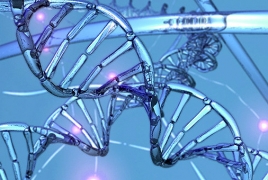Breakthrough in gene editing could treat ALS, Huntington's disease August 14, 2017 - 14:56 AMT PanARMENIAN.Net - The most common gene editing technique, CRISPR-Cas9, only modifies DNA. That's helpful in most cases, but it means that you can't use it to tackle RNA-based diseases. Thankfully, that might not be a problem for much longer. After plenty of talk about editing RNA, researchers have developed a new RNA-oriented technique (RCas9) that can correct the molecular errors which lead to diseases like hereditary ALS and Huntington's, Engadget reports. The team achieved its feat using guide RNA that steers the editing enzyme toward a matching sequence of target RNA molecules. In the lab, it's highly effective -- it fixed nearly all of the broken RNA targets in muscle cells, leaving cells that were far healthier. Of course, this is in lab conditions. The scientists readily admit that there's much more work to be done before gene editing could help in the field. More than anything, it would be difficult to send RCas9 to patient cells. The benign viruses you'd normally use for gene therapy just can't hold a full-fledged Cas9 payload; the researchers had to prune theirs to make it fit. And of course, there's the question of conducting trials and proving that the technique is safe. Right now, there aren't any therapies that would stall the onset of diseases like ALS. This wouldn't likely represent a cure, but it could give patients full functionality for longer before the effects of their diseases set in. Yerevan will host the 2024 edition of the World Congress On Information Technology (WCIT). Rustam Badasyan said due to the lack of such regulation, the state budget is deprived of VAT revenues. Krisp’s smart noise suppression tech silences ambient sounds and isolates your voice for calls. Gurgen Khachatryan claimed that the "illegalities have been taking place in 2020." Partner news |